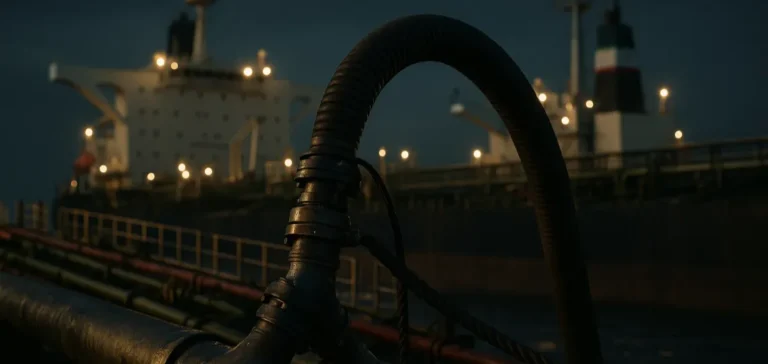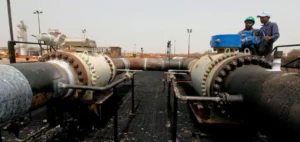Iraqi authorities categorically rejected on Friday American accusations concerning their participation in smuggling operations allowing Iran to circumvent international sanctions. The director of the State Oil Marketing Organization (SOMO), Ali Nizar, declared to the state press agency INA that there are no smuggling or oil blending operations in Iraqi ports or territorial waters. This declaration comes after Washington exposed complex networks generating between one and three billion US dollars per year, according to Western intelligence sources and confidential reports consulted by several international agencies.
The US Treasury Department sanctioned in July 2025 six entities and four vessels for their knowingly established participation in the acquisition, sale, transport, or marketing of Iranian hydrocarbons. The sanctions notably target a network of companies led by Salim Ahmed Said, an Iraqi-British businessman, accused of profiting from smuggling Iranian oil presented as Iraqi oil or mixed with Iraqi hydrocarbons. Official US documents indicate that Said controls VS Tankers FZE, formerly known as Al-Iraqia Shipping Services & Oil Trading FZE (AISSOT), a company based in the United Arab Emirates involved in these operations since at least 2020.
Sophisticated diversion mechanisms
The system relies on two main methods identified by Western intelligence services. The first involves ship-to-ship transfers in territorial waters between Iran and Iraq, where Iranian oil is mixed with Iraqi oil before being sold on international markets with false certificates of origin. This technique exploits the chemical similarity between Iranian and Iraqi oils, making their distinction scientifically impossible after blending. The second method consists of diverting heavy fuel oil subsidized by the Iraqi government, initially intended for national asphalt plants at preferential prices of 100 to 150 dollars per ton, to illegally re-export it to Asian markets where it trades between 300 and 500 dollars per ton.
The volumes involved reach industrial proportions with between 500,000 and 750,000 metric tons of heavy fuel oil diverted monthly, equivalent to 3.4 to 5 million barrels of oil. Data from Middle East Economic Survey (MEES) reveals that in March 2024, the gap between official fuel exports declared by SOMO and actual exports tracked by maritime intelligence services reached 315%, representing approximately 300,000 barrels per day undeclared, valued at 14 million dollars daily. The ports of Khor Al-Zubair and Umm Qasr serve as main export points, while Basra constitutes the nerve center of blending operations.
Political actors and militias involved
The network involves Asaib Ahl al-Haq (AAH), a Shiite paramilitary organization designated as a foreign terrorist organization by Washington in January 2020. AAH, led by Qais al-Khazali and counting approximately 10,000 fighters, controls 18 asphalt plants receiving subsidized fuel allocations and holds 16 seats in the Iraqi parliament. The organization, supported by the Iranian Islamic Revolutionary Guard Corps, has claimed more than 6,000 attacks against American and coalition forces since its creation in 2006. Kataib Hezbollah, another pro-Iranian militia designated as a terrorist organization, also participates in the system by controlling several strategic industrial installations.
Prime Minister Mohammed Shia al-Sudani, who came to power in October 2022 with the support of AAH and the Coordination Framework dominated by pro-Iranian factions, faces contradictory pressures. His predecessor, Mustafa al-Kadhimi, had attempted to reduce smuggling by increasing the price of subsidized fuel from 70 to 220 dollars per ton and ordering an audit of the actual capacities of asphalt plants. These measures were largely reversed after al-Sudani’s arrival, with the price being reduced to between 100 and 150 dollars per ton in January 2023, facilitating the resumption of large-scale diversion operations.
American maximum pressure campaign
The Trump administration relaunched in February 2025 its maximum pressure policy against Iran via National Security Presidential Memorandum 2. This strategy has resulted in ten rounds of sanctions specifically targeting Iranian oil networks between February and August 2025. The July 2025 sanctions against Salim Ahmed Said and his network mark a significant escalation, exposing corruption mechanisms involving Iraqi parliament members who allegedly received millions of dollars in bribes to falsify documents allowing Iranian oil to pass as Iraqi oil.
An Agence France-Presse photographer present in southern Iraq on Tuesday documented a security campaign conducted by the Iraqi navy in territorial waters. Naval forces inspected papers and authorizations of vessels to verify the legality of their activities, in what appears as an attempt to demonstrate authorities’ vigilance in face of American accusations. This publicized operation comes as Iraqi officials fear that the Trump administration might impose secondary sanctions on Iraqi institutions involved in helping circumvent Iranian sanctions.
The implications for the global oil market remain substantial. Commercial operators must strengthen their due diligence on the origin of shipments from the Persian Gulf, particularly those transiting through Iraqi ports. Energy sector analysts are closely monitoring the evolution of this situation which could affect up to 5% of undeclared oil supplies circulating on international markets. The Iraqi government’s dependence on pro-Iranian militias to maintain its political stability considerably complicates any serious attempt to dismantle these networks, creating a strategic dilemma for Baghdad caught between Washington’s demands and Tehran’s influence.






















